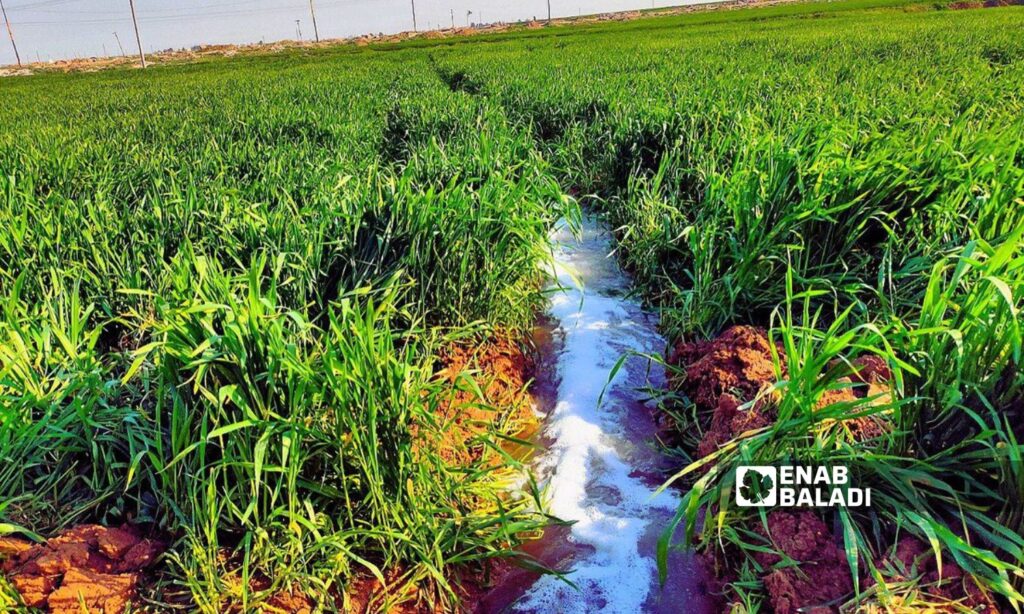Al-Hasakah – Majd al-Salem
Farmers in al-Hasakah, northeastern Syria, expressed optimism about their agricultural crops this season, anticipating a bountiful production during the harvest season after experiencing heavy rainfall.
This optimism is mixed with concerns about potential low purchase prices, merchants’ monopolies, lack of markets for selling crops, and natural disasters (hail or fires).
Despite the Autonomous Administration of North and East Syria (AANES) expressing intention to buy all wheat quantities from the farmers, previous experiences and pricing have left an impact on the farmers’ morale.
A promising season
Ibrahim al-Hamid (49 years old) from rural Qamishli, mentioned a noticeable difference this season compared to previous years regarding the condition of crops, especially the rain-fed ones, as the timely heavy rainfall allowed the wheat crops to grow well, expecting this to result in a generous harvest positively reflecting on the farmers’ income and compensating for losses incurred in previous years.
Al-Hamid owns 22 hectares planted with rain-fed wheat, describing their condition as “excellent.” However, due to excessive rain, weeds spread alongside the crops, forcing al-Hamid and many other farmers to use pesticides to eliminate them.
He added, comparing rain-fed and irrigated plantations, the former are close in state to the latter, benefiting more as the irrigated require higher costs from fuel or solar energy and require more farming operations like plowing and labor costs.
Meanwhile, farmer Abdul Rahman Suleiman (45 years old) from rural Jazah (southern Qahtaniya countryside), told Enab Baladi that the season’s rains have saved the irrigated crops, which rely on diesel pumps for irrigation. He noted that owners of these crops suffer annually from delayed diesel entitlement deliveries, jeopardizing the crops during “critical times for crop growth.”
He continued that the crops in the south of the al-Rad area (the southernmost countryside of Qamishli up to the Iraqi border) are in very good condition, resembling the 2019 season, which was also abundant in rainfall and production.
Fears of price and disasters
Despite the “satisfaction” among farmers this season and their contentment with the state of agricultural crops, whether rain-fed or irrigated, some fear a repeat of the 2019 fire scenario that destroyed thousands of hectares and caused losses worth hundreds of millions of Syrian pounds.
Abd Haji al-Hussein (56 years old), a farmer from southern Qamishli countryside, told Enab Baladi that the risk of hail is still present, and the occurrence of fires during crop drying is possible, adding that the farmer remains in a state of “anxiety and expectation” until the last moments of the season.
He has 15 hectares of irrigated wheat, costing about $100 per hectare for seeds and plowing, awaiting the Autonomous Administration to set the wheat price, while describing the regime government‘s price of 5500 Syrian pounds per kilogram ($0.36) as “suitable” only for rain-fed cultivations.
As for irrigated crops, the pricing is “low and unsuitable, not enough to cover costs and make a profit,” and if the Syrian pound continues to fall against the dollar, these prices will not be suitable even for the rain-fed crop owners.
Agricultural engineer Tariq al-Ayed from Qamishli told Enab Baladi that the condition of agricultural crops this year is very good, and crops in stable agricultural regions are similar even to the fourth stability area (south of the al-Rad area), which typically receives less rainfall but promises good yields this season.
He added that areas planted with aromatic and leguminous crops like cumin and lentils have increased from previous years, benefiting from the abundance of rain. However, the threat of hail remains, endangering crops that have reached the grain filling stage.
Plan for wheat collection
On April 17, the director of agriculture in al-Hasakah, Engineer Ali Khalouf al-Jasim, said that wheat and barley crops are in a “safe” stage due to the abundant rainfall, and that the barley-planted area in the province, totaling 351,700 hectares, has reached the spike growing stage.
He added that 75% of the area planted with irrigated wheat, totaling 93,000 hectares, has reached this stage, while 25% is in the “knotting” stage.
He mentioned that the area planted with rain-fed wheat, totaling 375,500 hectares, is distributed between the knotting and spike growing stages, with spike flowering marking the beginning of grain formation, a critical stage that requires care to ensure high-quality, abundant production.
According to Ahmad Younes, co-chair of AANES’ Agriculture and Irrigation Authority, a five-year plan has been developed for collecting the wheat crop for the 2023-2024 farming season. This aims to improve the efficiency of collection, storage, and distribution processes and enhance self-sufficiency in wheat in the region, supporting farmers and increasing productivity.
This plan includes equipping three silos in Tel Hamis with a capacity of 130,000 tons and establishing five new silos, each with a capacity of 12,000 tons. This year, the number of grain collection centers will total 30, with a capacity exceeding 1.5 million tons from the expected production for the current season.
In the 2023 season, AANES bought 1,150,000 tons of wheat from farmers at a price of $0.43 per kilogram (3700 Syrian pounds at the time).

